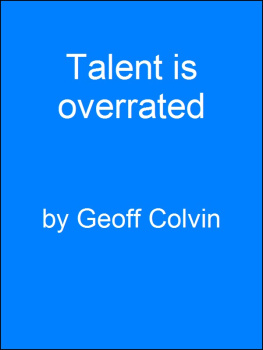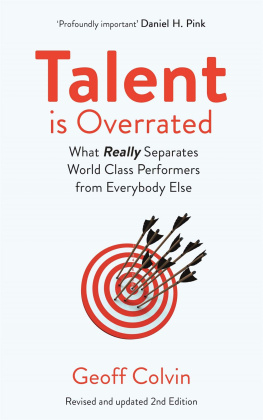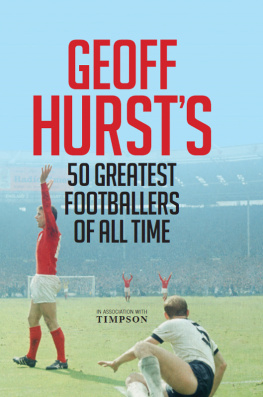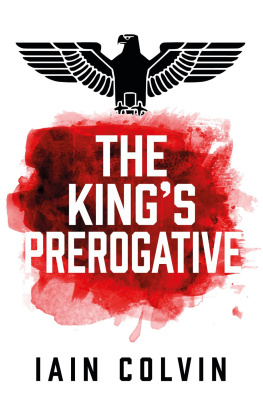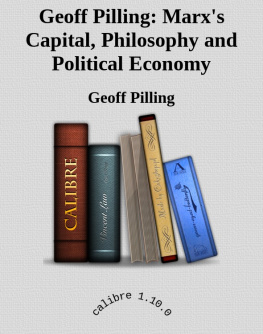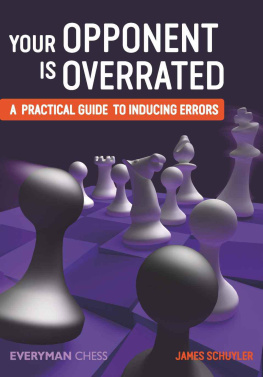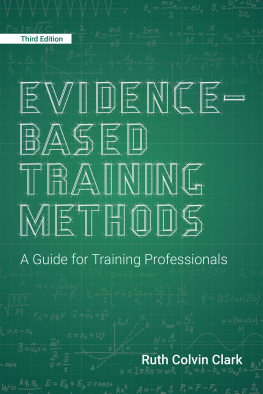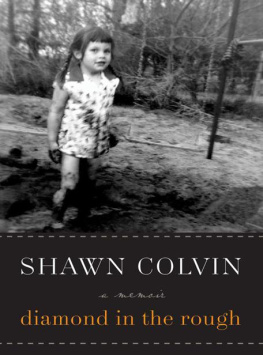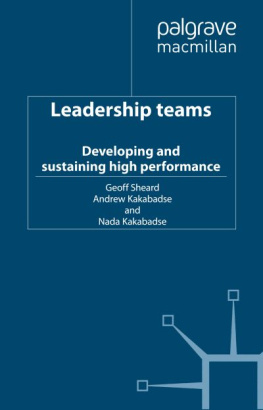Geoff Colvin - Talent Is Overrated: What Really Separates World-Class Performers from Everybody Else
Here you can read online Geoff Colvin - Talent Is Overrated: What Really Separates World-Class Performers from Everybody Else full text of the book (entire story) in english for free. Download pdf and epub, get meaning, cover and reviews about this ebook. genre: Romance novel. Description of the work, (preface) as well as reviews are available. Best literature library LitArk.com created for fans of good reading and offers a wide selection of genres:
Romance novel
Science fiction
Adventure
Detective
Science
History
Home and family
Prose
Art
Politics
Computer
Non-fiction
Religion
Business
Children
Humor
Choose a favorite category and find really read worthwhile books. Enjoy immersion in the world of imagination, feel the emotions of the characters or learn something new for yourself, make an fascinating discovery.
- Book:Talent Is Overrated: What Really Separates World-Class Performers from Everybody Else
- Author:
- Genre:
- Rating:5 / 5
- Favourites:Add to favourites
- Your mark:
- 100
- 1
- 2
- 3
- 4
- 5
Talent Is Overrated: What Really Separates World-Class Performers from Everybody Else: summary, description and annotation
We offer to read an annotation, description, summary or preface (depends on what the author of the book "Talent Is Overrated: What Really Separates World-Class Performers from Everybody Else" wrote himself). If you haven't found the necessary information about the book — write in the comments, we will try to find it.
Geoff Colvin: author's other books
Who wrote Talent Is Overrated: What Really Separates World-Class Performers from Everybody Else? Find out the surname, the name of the author of the book and a list of all author's works by series.
Talent Is Overrated: What Really Separates World-Class Performers from Everybody Else — read online for free the complete book (whole text) full work
Below is the text of the book, divided by pages. System saving the place of the last page read, allows you to conveniently read the book "Talent Is Overrated: What Really Separates World-Class Performers from Everybody Else" online for free, without having to search again every time where you left off. Put a bookmark, and you can go to the page where you finished reading at any time.
Font size:
Interval:
Bookmark:

Table of Contents
It is mid 1978, and we are inside the giant Procter & Gamble headquarters in Cincinnati, looking into a cubicle shared by a pair of twenty-two-year old men, fresh out of college. Their assignment is to help sell Duncan Hines brownie mix, but they spend a lot of their time just rewriting memos according to strict company rules. They are clearly smart: one has just graduated from Harvard, the other from Dartmouth. But that doesn't distinguish them from a slew of other new hires at P&G. What does distinguish them from many of the young go-getters the company takes on each year is that neither man is particularly filled with ambition. Neither has any kind of career plan or any specific career goals. Every afternoon they play waste-bin basketball with wadded-up memos. One of them later recalls, "We were voted the two guys probably least likely to succeed."
These two young men are of interest to us now for only one reason: They are Jeffrey Immelt and Steven Ballmer, who before age fifty would become CEOs of the world's two most valuable corporations, General Electric and Microsoft. Contrary to what any reasonable person would have expected when they were new recruits, they reached the absolute apex of corporate achievement. The obvious question is how.
Was it talent? If so, it was a strange kind of talent that hadn't revealed itself in the first twenty-two years of their lives. Was it brains? These two were sharp but had shown no evidence of being sharper than thousands of their classmates or colleagues. Was it mountains of hard work? Certainly not up to that point.
And yet something carried them to the heights of the business world. Which leads to perhaps the most puzzling question, one that applies not just to Immelt and Ballmer but also to everyone in our lives and to ourselves: If that certain something turns out not to be any of the the things we usually think of, then what is it?
Look around you.
Look at your friends, your relatives, your coworkers, the people you meet when you shop or go to a party. How do they spend their days? Most of them work. They all do many other things as well, playing sports, performing music, pursuing hobbies, doing public service. Now ask yourself honestly: How well do they do what they do?
The most likely answer is that they do it fine. They do it well enough to keep doing it. At work they don't get fired and probably get promoted a number of times. They play sports or pursue their other interests well enough to enjoy them. But the odds are that few if any of the people around you are truly great at what they doawesomely, amazingly, world-class excellent.
Whyexactly whyaren't they? Why don't they manage businesses like Jack Welch or Andy Grove, or play golf like Tiger Woods, or play the violin like Itzhak Perlman? After all, most of them are good, conscientious people, and they probably work diligently. Some of them have been at it for a very long timetwenty, thirty, forty years. Why isn't that enough to make them great performers? It clearly isn't. The hard truth is that virtually none of them has achieved greatness or come even close, and only a tiny few ever will.
This is a mystery so commonplace that we scarcely notice it, yet it's critically important to the success or failure of our organizations, the causes we believe in, and our own lives. In some cases we can give plau sible explanations, saying that we're less than terrific at hobbies and games because we don't take them all that seriously. But what about our work? We prepare for it through years of education and devote most of our waking hours to it. Most of us would be embarrassed to add up the total hours we've spent on our jobs and then compare that number with the hours we've given to other priorities that we claim are more important, like our families; the figures would show that work is our real priority. Yet after all those hours and all those years, most people are just okay at what they do.
In fact the reality is more puzzling than that. Extensive research in a wide range of fields shows that many people not only fail to become outstandingly good at what they do, no matter how many years they spend doing it, they frequently don't even get any better than they were when they started. Auditors with years of experience were no better at detecting corporate frauda fairly important skill for an auditorthan were freshly trained rookies. When it comes to judging personality disorders, which is one of the things we count on clinical psychologists to do, length of clinical experience told nothing about skill"the correlations," concluded some of the leading researchers, "are roughly zero." Surgeons were no better at predicting hospital stays after surgery than residents were. In field after field, when it came to centrally important skillsstockbrokers recommending stocks, parole officers predicting recidivism, college admissions officials judging applicantspeople with lots of experience were no better at their jobs than those with very little experience.
The most recent studies of business managers confirm these results. Researchers from the INSEAD business school in France and the U.S. Naval Postgraduate School call the phenomenon "the experience trap." Their key finding: While companies typically value experienced man agers, rigorous study shows that, on average, "managers with experience did not produce high-caliber outcomes."
Bizarre as this seems, in at least a few fields it gets one degree odder. Occasionally people actually get worse with experience. More experienced doctors reliably score lower on tests of medical knowledge than do less experienced doctors; general physicians also become less skilled over time at diagnosing heart sounds and X-rays. Auditors become less skilled at certain types of evaluations.
What is especially troubling about these findings is the way they deepen, rather than solve, the mystery of great performance. When asked to explain why a few people are so excellent at what they do, most of us have two answers, and the first one is hard work. People get extremely good at something because they work hard at it. We tell our kids that if they just work hard, they'll be fine. It turns out that this is exactly right. They'll be fine, just like all those other people who work at something for most of their lives and get along perfectly acceptably but never become particularly good at it. The research confirms that merely putting in the years isn't much help to someone who wants to be a great performer.
So our instinctive first answer to the question of exceptional performance does not hold up.
Our second answer is the opposite of the first, but that doesn't stop us from believing it fervently. It goes back at least twenty-six hundred years, to the time of Homer:
Call in the inspired bard
Demodocus. God has given the man the gift of song.
That's from the Odyssey, one of many references in it and the Iliad to the god-given gifts of various characters. We've changed our views on a lot of important matters since thenhow the planets move, where diseases come frombut we have not changed our views on what makes some people extraordinarily good at what they do. We still think what Homer thought: that the awesomely great, apparently superhuman performers around us came into this world with a gift for doing exactly what they ended up doingin the case of Demodocus, compos ing and singing. We use the same words that the ancient Greeks used, simply translated. We still say, as Homer did, that great performers are inspired, meaning that their greatness was breathed into them by gods or muses. We still say they have a gift, which is to say their greatness was given to them, for reasons no one can explain, by someone or some thing apart from themselves.
Next pageFont size:
Interval:
Bookmark:
Similar books «Talent Is Overrated: What Really Separates World-Class Performers from Everybody Else»
Look at similar books to Talent Is Overrated: What Really Separates World-Class Performers from Everybody Else. We have selected literature similar in name and meaning in the hope of providing readers with more options to find new, interesting, not yet read works.
Discussion, reviews of the book Talent Is Overrated: What Really Separates World-Class Performers from Everybody Else and just readers' own opinions. Leave your comments, write what you think about the work, its meaning or the main characters. Specify what exactly you liked and what you didn't like, and why you think so.

